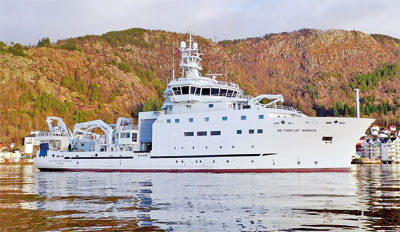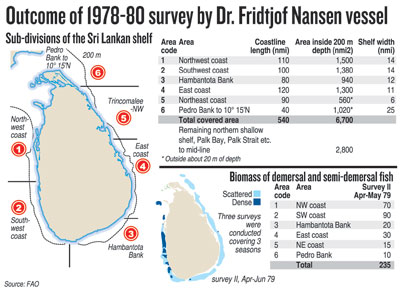News
Norwegian vessel to dig up fish life, marine eco system data in Sri Lanka
The Norwegian research vessel RV-Dr Fridtjof Nansen will sail into Sri Lankan waters next year to help assess fish stocks. The methods and timeline of the survey was finalised this week at a three-day workshop involving fisheries experts from Sri Lanka, Norway, and the Food and Agriculture Organisation.

The research vessel RV-Dr Fridtjof Nansen will sail into Sri Lankan waters next year
This 550-foot long vessel which is 200 feet wide, can carry 45 persons — crew of 15 and 30 scientists. It has 16 wet and dry laboratories.
The ship is owned by the Norwegian Agency for Development Cooperation (NORAD) and is jointly operated by the Institute of Marine Research of Norway, and FAO to help developing countries improve their fisheries management.
In a two-year survey, it will study the status of marine resources including fish stocks and investigate stocks of unexploited/underused fishery resources on the continental shelf and slope. The last such assessment was done by the vessel of the same name from 1978 to 1980.
The first Nansen research vessel was launched in 1975. It was named after Dr. Fridtjof Nansen; a Norwegian explorer, scientist and Nobel Peace Prize laureate. The first research vessel operated until 1993. The second ship too was named as Dr. Fridtjof Nansen and served until late 2016.
Third Dr. Fridtjof Nansen ship due in Sri Lanka was launched in March this year by Norway Prime Minister Erna Solberg. Addressing a reception this week, Norwegian fisheries biologist Jens-Otto Krakstad explained that the ship is one of most advanced research vessel in the world with multi-disciplinary research capabilities.
Though the project will mainly assess fish stocks, the state of the marine ecosystems and other parameters such as oceanic oxygen levels, salinity, PH levels etc. too will be measured. Identifying the impacts of climate change on ecosystem structure and productivity is one of the objectives of the Nansen project. The oceanic pollution and amount of plastic debris will be measured.
The survey will be funded by Norway and implemented with the collaboration of Fisheries Ministry, NARA (National Aquatic Resources Research and Development Agency), FAO and the Norwegian Centre for Development Cooperation in Fisheries.
Sri Lankan scientists will be involved. Dr Palitha Kithsiri of NARA said this would be an opportunity to learn and understand modern oceanic research technologies.
To date the vessel has carried out surveys in over 60 countries and collected vast amounts of data, according to an FAO brochure. In all the surveys, scientists from the beneficiary countries have received hands-on training in survey design, implementation, analysis and report writing. On average, there are eight to 10 surveys a year over 270 survey days involving about 80 participants from developing countries, the FAO brochure says.
The Ambassador of Norway to Sri Lanka and Maldives, Thorbjørn Gaustadsæther said the vessel will make it possible to significantly step up Norway’s assistance for ecosystem-based marine management in developing countries. He said Norway is willing to assist Sri Lanka in developing sustainable fishing practices.


